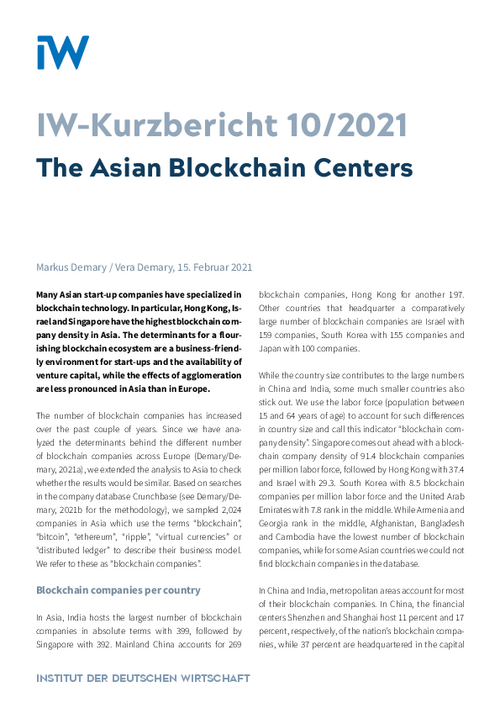Many Asian start-up companies have specialized in blockchain technology. In particular, Hong Kong, Israel and Singapore have the highest blockchain company density in Asia. The determinants for a flour-ishing blockchain ecosystem are a business-friendly environment for start-ups and the availability of venture capital, while the effects of agglomeration are less pronounced in Asia than in Europe.

The Asian Blockchain Centers
IW-Kurzbericht

Many Asian start-up companies have specialized in blockchain technology. In particular, Hong Kong, Israel and Singapore have the highest blockchain company density in Asia. The determinants for a flour-ishing blockchain ecosystem are a business-friendly environment for start-ups and the availability of venture capital, while the effects of agglomeration are less pronounced in Asia than in Europe.
The number of blockchain companies has increased over the past couple of years. Since we have ana-lyzed the determinants behind the different number of blockchain companies across Europe (Demary/Demary, 2021a), we extended the analysis to Asia to check whether the results would be similar. Based on searches in the company database Crunchbase (see Demary/Demary, 2021b for the methodology), we sampled 2,024 companies in Asia which use the terms “blockchain”, “bitcoin”, “ethereum”, “ripple”, “virtual currencies” or “distributed ledger” to describe their business model. We refer to these as “blockchain companies”.
Blockchain companies per country
In Asia, India hosts the largest number of blockchain companies in absolute terms with 399, followed by Singapore with 392. Mainland China accounts for 269 blockchain companies, Hong Kong for another 197. Other countries that headquarter a comparatively large number of blockchain companies are Israel with 159 companies, South Korea with 155 companies and Japan with 100 companies.
While the country size contributes to the large numbers in China and India, some much smaller countries also stick out. We use the labor force (population between 15 and 64 years of age) to account for such differences in country size and call this indicator “blockchain company density”. Singapore comes out ahead with a blockchain company density of 91.4 blockchain companies per million labor force, followed by Hong Kong with 37.4 and Israel with 29.3. South Korea with 8.5 blockchain companies per million labor force and the United Arab Emirates with 7.8 rank in the middle. While Armenia and Georgia rank in the middle, Afghanistan, Bangladesh and Cambodia have the lowest number of blockchain companies, while for some Asian countries we could not find blockchain companies in the database.
In China and India, metropolitan areas account for most of their blockchain companies. In China, the financial centers Shenzhen and Shanghai host 11 percent and 17 percent, respectively, of the nation’s blockchain companies, while 37 percent are headquartered in the capital Beijing. Although India also exhibits some concentra-tion of blockchain companies, the regional distribu-tion is much more diverse. Bangalore hosts 16 percent followed by Delhi with 12 percent and Mumbai with 10 percent of the Indian blockchain companies. Other blockchain centers are Ahmedabad, Chennai, Gurgaon, Naida, Pune, Hyderabad, Indore and Jaipur.
China, the Russian Federation and India are the largest countries in Asia. In contrast to China and India, there are less Russian blockchain companies in the database. These companies focus on the capital Moscow and the city of Saint Petersburg. Moscow hosts close to three quarters of the nation’s blockchain companies.
Smaller countries in Asia also exhibit a concentration of blockchain companies in metropolitan areas. In Japan, the blockchain activity focusses on Tokyo. South Korea has two blockchain centers with Seoul and Yeoksandon with more than half of the country’s blockchain companies in Seoul. In Israel, blockchain companies are locat-ed most frequently in Tel Aviv with about half of the nation’s blockchain companies.

Markus Demary / Vera Demary: The Asian Blockchain Centers
IW-Kurzbericht

More on the topic
Not so Different?: Dependency of the German and Italian Industry on China Intermediate Inputs
On average the German and Italian industry display a very similar intermediate input dependence on China, whether accounting for domestic inputs or not.
IW
China’s Trade Surplus – Implications for the World and for Europe
China’s merchandise trade surplus has reached an all-time high and is likely to rise further. A key driver appears to be a policy push to further bolster Chinese domestic manufacturing production, implying the danger of significant overcapacities.
IW